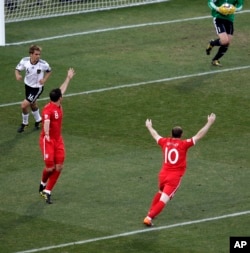Goal line technology makes its debut in international football this weekend at the Confederations Cup in Brazil.
FIFA, the sport's governing body bowed to international pressure after a missed call in the 2010 World Cup.
Video replays of a match between England and Germany clearly showed England's Frank Lampard scored a goal against Germany that was denied because neither the referee nor linesman saw the ball cross the goal line after it bounded down off the crossbar and out onto the field of play.
Goal control
FIFA, the sport's governing body bowed to international pressure after a missed call in the 2010 World Cup.
Video replays of a match between England and Germany clearly showed England's Frank Lampard scored a goal against Germany that was denied because neither the referee nor linesman saw the ball cross the goal line after it bounded down off the crossbar and out onto the field of play.
Goal control
Bjorn Linder’s job is to make sure officiating mistakes like that never happen again. He is the chairman of GoalControl, the German-based company awarded the contract for this year's Confederations Cup.
His team has been in Brazil for weeks prior to the upcoming matches as part of the FIFA certification process.
“The whole system uses 14 cameras that are installed on the catwalk," Linder said. "We have seven cameras per goal and computers that are connected to those cameras. The computers are catching images, around 500 pictures per second.”
His team has been in Brazil for weeks prior to the upcoming matches as part of the FIFA certification process.
“The whole system uses 14 cameras that are installed on the catwalk," Linder said. "We have seven cameras per goal and computers that are connected to those cameras. The computers are catching images, around 500 pictures per second.”
Computers track the trajectory of the ball in real time and reconstruct the play.
“Once the computer perceives the ball has crossed the goal line, it gives a signal to the referee's watch," Linder said. "All the referees on the field receive the signal. It vibrates and gives an optical signal ‘goal’ and he knows a goal has occurred.”
Nic Fleming, a London-based science and technology writer, says “the electronic eyes on the goal line may settle arguments, but still depend on probability.”
Uncertain science
In a commentary in Nature, he writes the introduction of goal-line technology “will miss a huge opportunity to educate people about the role of uncertainty in science...These are fantastic tools, but let’s be realistic about their limitations, that science is about probabilities and it's quite important that the public understands that. What better way than to have this message in a game that's so popular.”
“Once the computer perceives the ball has crossed the goal line, it gives a signal to the referee's watch," Linder said. "All the referees on the field receive the signal. It vibrates and gives an optical signal ‘goal’ and he knows a goal has occurred.”
Nic Fleming, a London-based science and technology writer, says “the electronic eyes on the goal line may settle arguments, but still depend on probability.”
Uncertain science
In a commentary in Nature, he writes the introduction of goal-line technology “will miss a huge opportunity to educate people about the role of uncertainty in science...These are fantastic tools, but let’s be realistic about their limitations, that science is about probabilities and it's quite important that the public understands that. What better way than to have this message in a game that's so popular.”
GoalControl claims an accuracy of plus-or-minus 5 millimeters, well under FIFA’s minimum requirement of plus or minus 3 centimeters.
Fleming would like to see that number flashed on the screen so viewers could distinguish between replays and computer reconstruction and learn a little science.
“The wider point really is that science is central to many public debates today, whether that's climate change or nuclear power or genetic modification," Fleming writes. "In all of these cases science provides probabilities. It does not provide yes-no, black-white answers.”
Fleming would like to see that number flashed on the screen so viewers could distinguish between replays and computer reconstruction and learn a little science.
“The wider point really is that science is central to many public debates today, whether that's climate change or nuclear power or genetic modification," Fleming writes. "In all of these cases science provides probabilities. It does not provide yes-no, black-white answers.”
But as goal-line technology becomes an integral part of the sport, it is important to remember the referee, and not the computer, makes the final call.






